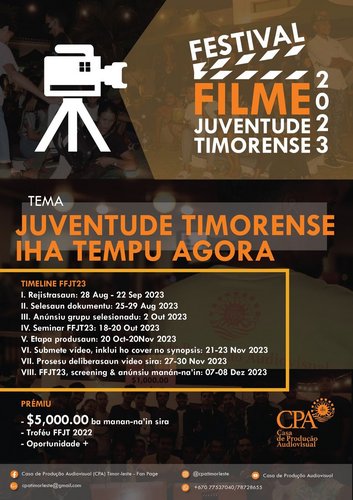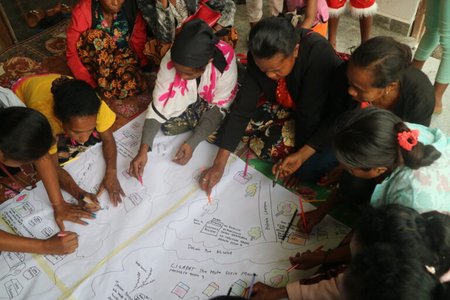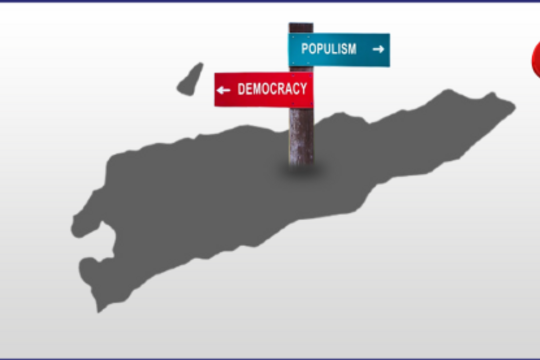In the summer, a training course on human rights brought Dorcy Roslya Daos from the media organization Casa de Produção Audiovisual (CPA) and Domingas Silva from Assosiasaun Chega! Ba Ita (ACbit) to Germany. CPA is involved in peace work and addresses socio-political issues in its films. ACbit works with survivors of human rights violations during the Indonesian occupation (1975 - 1999) and is campaigning on the findings and recommendations of the Truth and Reconciliation Commission.
Both organizations are partners of Misereor; CPA also works with AGIAMONDO in the Civil Peace Service programme.
In Cologne, the two young women were our guests at Stiftung Asienhaus. We also have a long-standing partnership based on solidarity. Timor-Leste is a country with a large proportion of young people: 35% of the population is under the age of 15 and the average age is just below 21. But the old generation, which fought for independence through resistance, continues to dominate politics. Even the parliamentary elections in May 2023 did not bring about a generational change.
Monika Schlicher and Maria Tschanz interviewed the two women, discussing the role of the younger generation, their motivation, and opportunities to effectively campaign for a just society and shape their own future.
Would you like to start by briefly introducing yourselves and your professional careers? What motivated you to do your work?
 Dorcy Roslya Daos: I work at CPA -Casa de Produção Audiovisual as a communications manager and support the organization in implementing its mission, including film production. We see ourselves as the 'voice of the voiceless' and have a special focus on marginalized groups, young people, and women in rural areas.
Dorcy Roslya Daos: I work at CPA -Casa de Produção Audiovisual as a communications manager and support the organization in implementing its mission, including film production. We see ourselves as the 'voice of the voiceless' and have a special focus on marginalized groups, young people, and women in rural areas.
I started as an intern and was quickly taken on by CPA. They recognized my potential and really encouraged me in my skills. Initially, I was trained as an illustrator, I went to Manila for further training in production and script writing and when the position of communications manager became available, I was allowed to take it on. I'm also good with languages, for example.
 Domingas Silva:Before studying in Indonesia for four years, I volunteered for six months at ACbit - Asosiasaun Chega! Ba Ita. When I returned to Dili with a degree in 'International Relation Studies', I was able to start there straight away. My first task was to translate the handbook on women, peace, and security from English into our local language, Tetum. I quickly found my passion in working directly with survivors of violence during the Indonesian occupation. These women are one of the most vulnerable groups, even today. Standing up for their rights together with them is very important to me.
Domingas Silva:Before studying in Indonesia for four years, I volunteered for six months at ACbit - Asosiasaun Chega! Ba Ita. When I returned to Dili with a degree in 'International Relation Studies', I was able to start there straight away. My first task was to translate the handbook on women, peace, and security from English into our local language, Tetum. I quickly found my passion in working directly with survivors of violence during the Indonesian occupation. These women are one of the most vulnerable groups, even today. Standing up for their rights together with them is very important to me.
Achieving independence was the overriding goal of the resistance generation. In 1999, at the time of the referendum held by the United Nations to resolve the conflict, you were not yet at school; as you told us, you were born in the mid-1990s. This makes you part of the first generation to grow up in independent Timor-Leste. How do you relate to the dreams and visions of the previous generation, do you share them or what are yours for the development of your country?
Dorcy Roslya Daos: Even though we did not actively fight before 1999, this does not mean that there is nothing left to fight for today. On the contrary: we work in our organizations because it is our passion to work for a just society. At CPA, we have the opportunity to maintain direct contact with the government and society. In many places, the government has lost contact with communities in rural areas and is no longer sufficiently aware of their needs.
Being the 'voice of the voiceless' means being an advocate and information carrier in both directions - drawing the government's attention to grievances and standing up for the interests of society. It is our responsibility to contribute with all our strength.
 Domingas Silva:In our organizations, we complete the bridge between government and society. Our task is to close a gap in understanding and bring in the voices of the marginalized. We also need to bridge the gap between the older and younger generations. The older generation is decisive in the political leadership of our country. How can we broaden their mindset attitude towards young people so that we too can have a say and take on leadership? There is also a lot of potential in our generation.
Domingas Silva:In our organizations, we complete the bridge between government and society. Our task is to close a gap in understanding and bring in the voices of the marginalized. We also need to bridge the gap between the older and younger generations. The older generation is decisive in the political leadership of our country. How can we broaden their mindset attitude towards young people so that we too can have a say and take on leadership? There is also a lot of potential in our generation.
Dorcy Roslya Daos: I believe in the power of different perspectives. If the ideas and attitudes of both generations are given space, they will complement each other in the best possible way for our nation-building. We stand for the future, the older generation carries the history.
Do you feel invited by the older generation to contribute your ideas and skills?
Dorcy Roslya Daos: Yes, absolutely! Much of what was fought for in the past has retained its importance today. We have a common mission: to stand up for peace, human rights and justice. But in order to get involved, we need to be able to show a greater presence. Our workplaces are the places where we, as a young generation, can currently make an impact.
Domingas Silva: We work with female survivors of violence from the occupation. We have to fight hard for their contribution to the resistance to be visible and recognized. In the strong patriarchal attitude of the veteran-ridden government and society, only the male fighters count as heroes. For example, when we at ACbit campaign for a law on reparations that includes all those affected, we are not listened to by the government. There is a special system to support veterans, and their children are also provided with a variety of educational and health benefits. Civilian female survivors of violence are left empty-handed. Yet they urgently need therapeutic help - both physically and mentally. They have to live with the consequences of torture, sexualized and other experiences of violence, and in some cases, they lack the most basic necessities for themselves and their children. Many have been abandoned by their families. In our work, we often come across women in rural areas who can only afford one meal a day. I find it incredibly moving that women still feel powerless today. This also reflects the dominance of the patriarchal social order.
Dorcy Roslya Daos:The neglect of the concerns of people in rural areas goes so far that although access to education is available, there is a lack of basic facilities in schools. In one of our last broadcasts, we reported on the case of children collecting large stones to use as chairs at school. We also found out that there was a direct correlation between the votes for the ruling party in the last local election and the issue of community support. We drew the authorities' attention to the problem, presented this case to the ministry and campaigned for it to be remedied immediately.
What have you already achieved as a young generation, where do you see processes of change?
Domingas Silva:I can't see my contribution in isolation from my work. By working in the organizations, we can contribute our impulses as a young generation in a very concrete way. For example, I was involved in setting up a support forum for and by survivors of violence, which is now led by them as agents of change. This means that survivors organize themselves so that they can take good care of themselves regardless of social attitudes and at the same time stand up for their rights - both individually and as a group. This initiative has been an important contribution to capacity building and empowerment, which has set a process of change in motion.

Another example: We are strongly interconnected in civil society and also maintain close cooperation with the Ministry of Social Solidarity. Our impetus for change extends into the private sector. We ensure that those affected, and their families receive urgent support, be it food or the provision of a coffin in the event of a death. We liaise with the Ministry of Justice and assist those affected in obtaining a birth certificate or an identity card for children born of rape. This becomes necessary when there is a problem that a father cannot or may not be named.
Dorcy Roslya Daos:In our media work, we specifically address problems faced by young people in rural areas: We raise awareness of their concerns at a social level as well as with the government. These include issues such as water and electricity supply, access to markets and job opportunities. Another serious problem is the situation of young girls, who are denied access to further education in their families in favor of their brothers. It is also not uncommon for girls to drop out of school due to early pregnancy, even though they would have the legal right to continue. Young people with disabilities often have no opportunity to attend secondary school in the capital; there is a lack of support facilities here.
 You have given us a vivid insight into how you as a young generation have room to participate in your organizations. What is the situation at the political level? Will there be opportunities for change as long as the old generation and the guard from the resistance dominate the government?
You have given us a vivid insight into how you as a young generation have room to participate in your organizations. What is the situation at the political level? Will there be opportunities for change as long as the old generation and the guard from the resistance dominate the government?
Domingas Silva: In the next elections in 5 years, the young generation will inevitably play a bigger role. We will face many challenges: Oil and gas reserves are running out, there is still a shortage of well-educated workers, a lack of job opportunities and economic conditions mean we are losing many young people abroad. To tackle all these problems, new ideas and solution models need to be implemented. So far, we see that political forces from the younger generation who think in new approaches have not been elected. The potential is there, because we have learned to empower and motivate ourselves with what we find.
Dorcy Roslya Daos: However, we must not forget how much we as the younger generation have not only learned from the older generation, but also how much we have been shaped by them. Many of us do not necessarily stand for a new attitude. In addition, many young people are still very hesitant to show and contribute their skills. We can encourage each other and speak with one voice. We have a common dream, and it is all the more important to develop the ability to work together.
Monika Schlicher & Maria Tschanz









